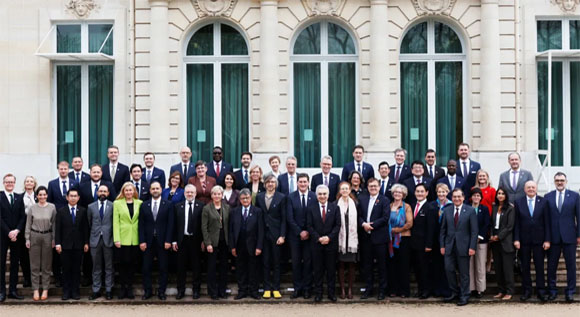50 years old: the International Energy Agency
Founded in 1974, in the midst of the global oil crisis, the International Energy Agency (IEA) has gained an outstanding global reputation over the last 50 years. Its reports and discussions are seen as a reliable pointer to the direction of international energy and climate policy.
 © IEA
© IEA
On 18 November 1974, 16 member countries of the Organisation for Economic Co-operation and Development (OECD) signed an agreement in Paris which led to the establishment of the International Energy Agency. The background to this was the global oil crisis and the desire to have strong measures in place to safeguard the supply of oil should another crisis occur.
Today, the IEA is regarded as the voice of the energy-consuming countries and as one of the world’s leading energy organisations. A stated aim of the work done by the IEA is to ensure the availability of reliable, affordable and clean energy for everyone in its Member States. To this end, the IEA acts as a central platform for sharing experience on virtually all aspects of energy policy. Reports, studies and events which are admired worldwide form the basis for many decisions and important discussions in a changing energy world.
Regular country reviews setting out policy recommendations, as well as the annual World Energy Outlook (WEO) (in German only), are highly respected sources for the formulation of national energy policies around the globe. The latest WEO works from the latest data and market developments to analyse future development scenarios on the energy markets up to 2050.
Energy security and the energy transition go hand in hand
For many years, the focus of the IEA’s work was on energy security and economic growth. Today, climate action and in particular questions relating to the phase-out of energy production from fossil fuels play a key role in the agency’s activities. For example, the IEA Ministerial following COP 28, which took place in Dubai at the end of 2023, was the first platform for an international dialogue between energy ministers on the implementation of the global energy transition goals set by COP28. The Net Zero 2050 Roadmap, which was first published in 2021 and most recently updated in autumn 2023, shows the global energy sector a path towards attaining the global climate targets of the Paris Agreement.
Leading role in the implementation of the global energy transition
The acceptance of Latvia as the 32nd member of the IEA and of Senegal and Kenya as new Association countries means that the “IEA family” (IEA members, accession and association countries) now covers 80% of global energy demand. The establishment of the IEA Regional Cooperation Centre in Singapore aims to expand cooperation in south-east Asia and to act as a hub for the IEA in the region.
In their final communiqué, the IEA ministers highlight the agency’s leading role in the implementation of the global energy transition and the COP28 Global Stocktake decision to reduce greenhouse gas emissions. These include in particular the commitment to turn away from fossil fuels in energy systems, to triple global capacities for renewable energy, and to double the annual rate of improvement in energy efficiency, in each case by 2030. They underscored that energy and climate security are inextricably linked and emphasised that clean energy transitions ensure energy security. Further to this, the IEA is to be further strengthened in its core task of maintaining global energy security.

